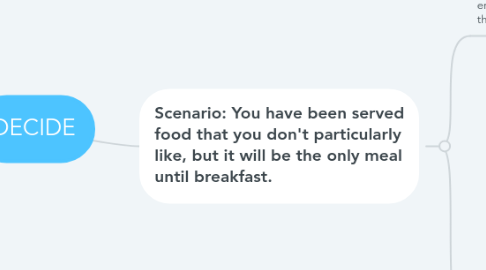
1. Scenario: You have been served food that you don't particularly like, but it will be the only meal until breakfast.
1.1. Defining the problem: You have been served food that you don't particularly like, but it will be the only meal until breakfast. The main dimension of wellness that is affected is physical wellness, although environmental wellness is also affected if the food is thrown away.
1.1.1. Consider the Consequences: If I eat the food, a positive consequence would be that I would not be hungry, but a negative consequence would be that I might have a bad feeling in your mouth for a while since you don't like the food. If I don't eat the food, a positive consequence would be that you won't have to eat something that I don't like, but a negative consequence would be I would be hungry until breakfast. It would also really negatively affect my health. If I lie that I have an allergy to the food, a positive consequence would be that I would have quite a good chance to get some food that I like more, but a negative consequence would be that I could get punished for lying, and that I would feel bad since I lied to the person preparing the food. This is a very risky choice since I have a high chance of being punished although there is a chance of having success. If I get punished for lying, the consequences could greatly negatively affect my future. Finally, if I ask for a different food, a positive consequence is that I could possibly get a different food, although if I don't, it is back to either eating or not eating the food again.
1.1.1.1. Decide and Act: Because lying is against my core values and not eating the food would be against my values and my family's values, I should either eat it or ask for some other food. However, asking for other food could be troublesome for the person preparing the food, and it could make them see me as a "picky eater", so I think the best decision would be to just simply eat it. I will try to eat it in small bits, and I will do this by setting a goal to eat one part of the food, then after I eat it, I try to eat another part, until I finish or become full.
1.2. Exploring alternatives: I could eat the food, don't eat the food, lie that you have an allergy to the food, or I could ask for a different food that you like more.
1.2.1. Identify your Values: One of my main core values is honesty. By delibrately lying to the person preparing the food, I would not be following my own core values. The best option for my health would be to either eat the food or to ask for different food, because if I don't eat the food, it will be bad for my health (physical wellness). I also feel that there are many people in the world that don't have food, saying that I should probably eat the food.
1.2.1.1. Evaluate the Results: I think that this decision made the most positive outcome to this scenario because it follows my core values and does not inconvenience others too much while also not wasting and then therefore throwing away food, thus being more environmentally well. This decision also helped contribute to my physical wellness because I am eating the food instead of not eating it, which does not provide any nutrition at all. In conclusion, this decision worked out very well because it helped me not become a picky eater while not inconveniencing others and while also helping with my environmental and physical wellness. From this decision, I learned that sometimes it is important not to inconvenience others just because of something minor such as food that you don't like. If I were to make this decision again, I would probably make the same decision because it helps with wellness the most while also following my core values and not inconveniencing others too much.
